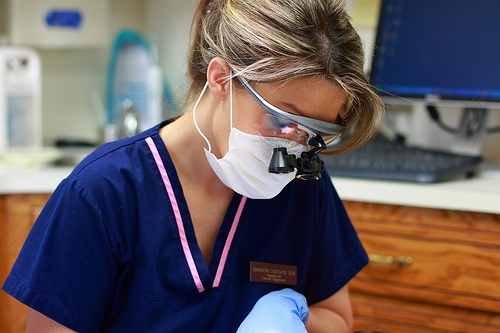The Safety of Dental X-Rays
February 20th, 2025

An article was released to the public stating that dental X-rays contribute to a type of brain cancer. After reading an article like this, your first thought may be to avoid dental X-rays, but you may want to hold off on that quick judgment. As with any treatment we offer at Daisy Mountain Dentistry, education is your most valuable tool in deciding what is best for you.
How often dental X-rays are taken is based on risk for infection, physical symptoms, and clinical findings. The American Dental Association (ADA) is a governing body over the dental profession. The ADA states, “ . . . healthy adults receive routine mouth X-rays every two to three years. Dental X-rays are recommended every one to two years for children and every 1.5 to three years for teens. Children often require more X-rays than adults because of their developing teeth and jaws and increased likelihood for cavities.”
A "caries risk category" often determines how often dental X-rays are taken. The most recent documented resource to determine a caries risk is Caries Management by Risk Assessment (CAMBRA). This was adopted by the ADA and is used by dental professionals giving interval recommendations for X-rays.
With knowledge of your risk for dental infection, you will be informed by Drs. Peter Vogel, Vijal Vadecha of the interval at which dental X-rays should be taken. You can rest assured that the standards published by the ADA have been researched extensively and are there to protect your personal health and safety.
Dental X-rays are most commonly digital, which significantly reduces exposure. There is more radiation exposure from the sun or in an airplane than in a dental X-ray. It is common practice to use a lead apron with a thyroid collar for protection during X-ray exposure.
Having a cavity means having an active, potentially harmful infection. Diagnosing such infection with minimal exposure through digital dental X-rays at our Anthem office does more good than harm.
How can veneers improve my smile?
February 13th, 2025

Drs. Peter Vogel, Vijal Vadecha and our team at Daisy Mountain Dentistry believe everyone’s smile should be a something they can be proud of. Most of us aren’t born with naturally perfect teeth, though, so it’s fortunate that cosmetic dentistry and veneers make it possible to achieve the smile of your dreams!
Dental veneers are a great option to improve your smile and are highly accessible to patients around the world. They’re made of porcelain and will be customized to fit the surface of your teeth perfectly. Our team will note your tooth size, color, and shape so your veneers will look completely natural.
Benefits of dental veneers
Appearance: Dental veneers can be undetectable to others because they look so natural. One of the best perks is that they are resistant to stains, so you don’t have to worry about discoloration over time.
Improvements: Not only will your smile look better, but many minor imperfections can be improved with dental veneers as well. Chipped teeth, discoloration, and gaps will be covered by your veneers.
Durability: Veneers are made from long-lasting porcelain materials, which means they are resistant to scratches and chipping. If you take care of them properly, they can look as good as new for years!
Flexibility: Patients have the option of choosing single veneers to repair chips or cracks in teeth or go for multiple teeth to create a completely new smile.
Considerations
Just because dental veneers can cover imperfections, that doesn’t mean your oral hygiene is any less vital. Your teeth and gums should be healthy and disease-free in order to be eligible for veneers.
Set up an initial consultation at our Anthem office today, and we can address any underlying issues you may have. Your perfect smile could be just a phone call away!
What do I do if I fall and loosen my teeth?
February 6th, 2025

Although teeth are strong enough to tear through food, they are also fragile. An accident such as a fall may loosen teeth or knock a tooth out entirely. When a child loses a baby tooth in this manner, no permanent damage is usually done. However, adults who loosen permanent teeth may need to visit our Anthem office.
The Anatomy of a Loose Tooth
The hard external layer of teeth covers a more vulnerable interior. The center of a tooth consists of the pulp, which contains blood vessels and nerves. The entire tooth extends below the surface of the gums into the jaw. Special tissue called cementum and the periodontal ligament hold teeth in place, preventing them from moving.
When a fall or blow to the face loosens a tooth, the tissues anchoring a tooth to the jaw may be damaged. This results in a loosened tooth that wiggles in place. There may be inflammation or bleeding of the gums, which signals dental damage.
Dental Treatments for a Loose Tooth
The range of dental treatments for loose teeth varies by the severity of the problem. If your teeth are just slightly loose following a fall, it may be fine to wait a few days. Teeth often retighten on their own. Simply avoid chewing with that tooth and enjoy softer foods for a few days.
If a tooth is very loose or nearly falling out, call Drs. Peter Vogel, Vijal Vadecha immediately. Immediate placement of the tooth back into the socket is needed to ensure its survival. In general, a tooth must return to its socket within two hours or it may be lost.
In some cases, Drs. Peter Vogel, Vijal Vadecha may recommend splinting, in which teeth are joined together to strengthen them and reduce strain on an individual tooth. Tightening or straightening the tooth can restore your ability to chew regularly without stressing the loosened tooth.
Regardless of the extent of the problem, it is essential to keep the tooth clean to prevent decay. Brush carefully with a soft-bristled brush, and use mouthwash regularly to kill bacteria.
Dental Anxiety
January 30th, 2025

If you suffer from dental anxiety, a visit to Daisy Mountain Dentistry might seem like a daunting prospect. Perhaps you had a bad experience in the past, but whatever the reason, please know that at our Anthem office, there is nothing to be afraid of. We understand you may be anxious about receiving dental treatments, and we’re here to help you have a comfortable, pain-free experience that will put your fears to rest.
You’re not alone!
A 1984 study that appeared in the Journal of the American Dental Association reported that up to 75% of all adults in the United States have some degree of dental anxiety. This includes five to ten percent whose dental anxiety is so severe that they try to avoid a dentist’s office at all costs.
Treatment
If you experience dental anxiety, it is important to let our office know in advance, so we can provide you with the dental care you need with an added touch of TLC. We can assist by explaining behavioral techniques for relaxation, by administering nitrous oxide (laughing gas), or by prescribing a relaxing medication prior to your dental procedure.


